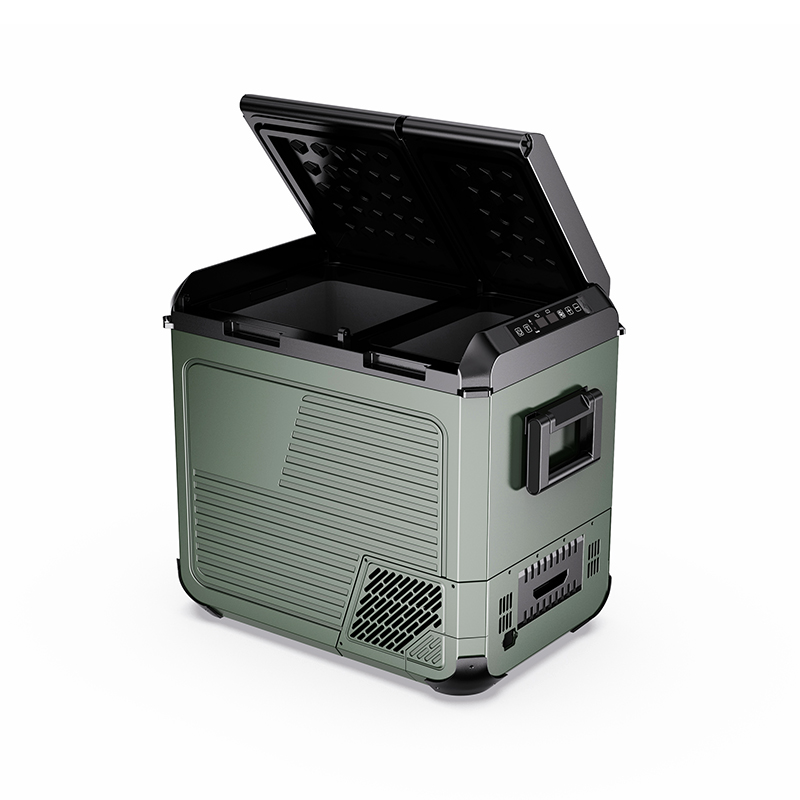Camping refrigerators have become essential for outdoor enthusiasts who want to preserve food and beverages while enjoying extended trips in nature. Unlike traditional coolers, these refrigerators provide consistent cooling and, in some cases, freezing capabilities, making them convenient for long journeys.

Types of Camping Refrigerators
1. Compressor Camping Refrigerators
Compressor refrigerators operate similarly to household refrigerators, using a compressor to cool the interior.
Key Features:
Efficient cooling regardless of ambient temperature.
Can reach freezing temperatures, allowing storage of frozen foods.
Durable and suitable for long-term use in vehicles or campsites.
Compressor refrigerators are ideal for RVs, car camping, and long-term trips where reliable cooling is crucial. They perform well in hot environments and maintain consistent temperatures even in conditions.
2. Thermoelectric Camping Refrigerators
Thermoelectric refrigerators use the Peltier effect to cool the interior.
Key Features:
Lightweight and portable, making them ideal for small vehicles or tents.
Low energy consumption and quiet operation.
Limited cooling capacity, typically maintaining temperatures slightly below ambient.
Thermoelectric models are suitable for short trips or cooler climates where moderate cooling is sufficient. They are less suitable for freezing food or handling hot conditions.
3. Absorption Camping Refrigerators
Absorption refrigerators use a heat source, such as propane, electricity, or battery power, to create cooling.
Key Features:
Can operate on multiple energy sources, offering flexibility in remote areas.
Silent operation due to no moving parts.
Suitable for both camping and mobile homes.
Absorption refrigerators are ideal for campers who require quiet, versatile cooling options without relying solely on electricity.
4. Portable Mini Camping Refrigerators
Mini camping refrigerators are compact, single-compartment units designed for portability.
Key Features:
Lightweight and easy to transport.
Usually powered by a 12V car outlet or USB connection.
Suitable for storing drinks, snacks, and small amounts of perishable items.
Mini refrigerators are convenient for day trips, picnics, or motorcycle and bicycle campers who need a compact cooling solution.
5. Drawer or Dual-Compartment Camping Refrigerators
These models include separate compartments for refrigeration and freezing.
Key Features:
Allows simultaneous cooling and freezing in one unit.
Often found in larger RV setups or car camping setups.
Provides organized storage for different food types.
Dual-compartment refrigerators are useful for campers carrying a variety of foods that require different temperatures, such as fresh vegetables and frozen meat.
Capacities of Camping Refrigerators
Camping refrigerators come in various capacities to suit different group sizes and trip durations.
1. Small Capacity (10–30 Liters)
Characteristics:
Suitable for 1–2 people on short trips.
Ideal for beverages, snacks, or small perishable items.
Lightweight and easy to transport.
Small refrigerators are convenient for personal use, day trips, or motorcycle camping, where space and weight are critical.
2. Medium Capacity (30–60 Liters)
Characteristics:
Suitable for small families or groups of 3–4 people.
Can store fresh food, beverages, and limited frozen items.
Balances storage capacity with portability.
Medium-sized models are popular among car campers and weekend travelers who need extra storage without compromising mobility.
3. Large Capacity (60–100+ Liters)
Characteristics:
Suitable for larger families, long-term trips, or group camping.
Allows storage of a wide variety of fresh and frozen foods.
Often heavier and requires vehicle mounting or stable placement.
Large-capacity refrigerators are ideal for RV trips, extended camping, or outdoor gatherings where significant food storage is necessary.
Uses of Camping Refrigerators
Preserving Perishable Foods: Fresh meat, vegetables, dairy, and other perishable items can be stored safely for several days.
Keeping Beverages Cool: Ensures that drinks remain refreshing during outdoor activities.
Storing Frozen Items: Compressor or dual-compartment models allow for freezing ice packs, meat, or seafood.
Outdoor Events: Useful for picnics, beach outings, or tailgating parties to maintain food safety.
Long-Term Camping Trips: Maintains consistent temperature for extended stays in remote locations.
Considerations When Choosing a Camping Refrigerator
Trip Duration and Group Size: Determine the needed capacity based on how many people will use the fridge and for how long.
Power Source: Select between 12V car outlets, batteries, solar panels, or gas, depending on available resources.
Cooling Requirements: Consider whether refrigeration, freezing, or dual-compartment functionality is necessary.
Portability: For frequent moves or motorcycle trips, lightweight and compact models are preferable.
Durability: Choose materials and build quality suitable for outdoor environments and transportation.